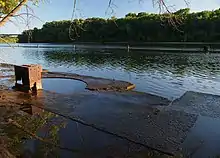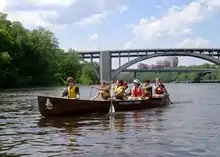Mississippi Gorge Regional Park
Mississippi Gorge Regional Park is a regional park along the east and west bluffs of the Mississippi River in the cities of Minneapolis and Saint Paul in the U.S. state of Minnesota. The two-city park area is between Mississippi river miles 848 and 852, from just south of Northern Pacific Bridge Number 9 to just north of Minnehaha Regional Park, and lies within the Mississippi National River and Recreation Area. The park area protects scenic and natural areas of the Mississippi River gorge, the only true gorge along the entire length of the 2,320-mile (3,730 km) river.[3]
| Mississippi Gorge Regional Park | |
|---|---|
| Mississippi River Gorge Regional Park | |
 Bluffs of the Mississippi River from the Short Line Bridge looking north | |
| Type | Regional park |
| Location | U.S. state of Minnesota |
| Coordinates | 44°56′10″N 93°12′2″W[1] |
| Area | 132 acres (53 ha) in Minneapolis[1] |
| Elevation | 747 feet (228 m) |
| Owned by |
|
| Managed by |
|
| Visitors | Gorge park total visits:
|
| Status | Open |
| Paths |
|
| Terrain | River gorge of the Mississippi |
| Designation | Mississippi National River and Recreation Area |
| Public transit access | MetroTransit buses |
| Website | |
In Minneapolis, Mississippi Gorge Regional Park is managed by the Minneapolis Park and Recreation Board. In Saint Paul, the park area's official name is the Mississippi River Gorge Regional Park, and is managed by the Park and Recreation Department. The 132-acre (53 ha) park (acreage for Minneapolis parkland only[1]) provides access to the river and is popular for its hiking and biking paths on the bluffs. Among local residents, the gorge is known and appreciated for its semi-wild character in the middle of an urban metropolitan area.[1] The two-city park areas had a combined 2.7 million visits in 2017.[2]
History

The Mississippi River gorge was formed over thousands of years by the retreating River Warren Falls that are known today as Saint Anthony. Softer sandstone gave way and slowly collapsed the harder limestone and shale layers in to the valley.[4] The river valley in Minneapolis and Saint Paul is the only gorge along the entire 2,320-mile (3,730 km) length of the Mississippi River[5][3] with bluffs rising as high as 150 feet (46 m).[6] The river through the gorge was a series of rapids until the early 1900s when it was reconfigured for commercial navigation with installment of locks and dams.[7]
A 72-mile (116 km) corridor of the Mississippi through the Twin Cities was designed by Minnesota Governor Wendell Anderson in 1972 as a critical natural resource area. In 1998, the United States Congress created the Mississippi National River and Recreation Area for the same corridor, bringing federal support and designation to the gorge area.[8]
The land area between the two bluffs is managed as public park land by the cities of Minneapolis and Saint Paul. The Minneapolis Park and Recreation Board, an independent park district, manages the park area in Minneapolis, which is officially named Mississippi Gorge Regional Park and includes the 132 acres of land area flanking both the east and west banks of the Mississippi River, from just south of Bridge Number 9 to the north edge of Minnehaha Regional Park. In Saint Paul, the park area is officially named Mississippi River Gorge Regional Park, and is managed by the city's Park and Recreation Department. In recent years, communities and park agencies have formed partnerships to improve the ecologic health of the gorge. In the late 1990s, the National Park Service, Minneapolis park board, and Longfellow community council restored an oak savanna near East 36th Street, which allowed park visitors to experience what the gorge area looked like before European-American settlement.[4]
Park areas
The regional parks in Minneapolis and Saint Paul contain several distinct historic sites and parks along the gorge.[1][9]
Minneapolis
Bluff Street Park - There is an upper and lower portion of the 5.3-acre (2.1 ha) park in the Cedar-Riverside neighborhood and a trail that connects downtown Minneapolis with Bridge Number 9 and the University of Minnesota.[10]
Bohemian Flats - The location of the historic Little Bohemia shanty town has picnic areas and river cruise boats.[11]
East River Flats Park - Located just below the University of Minnesota on the east bank of the Mississippi below the bluffs, it is the training site of the women's rowing team and contains grassy areas, picnic tables, and trails.[12]
East River Parkway - The 2-mile (3.2 km) pedestrian and bike trail that runs along the east bluff of the Mississippi from Washington Avenue to Emerald Street.[13]
Franklin Terrace Dog Park - The 1.37-acre (0.55 ha), fenced area off Franklin Terrace in the Seward neighborhood for off-leash dogs is adjacent to Riverside Park.[14]
Riverside Park - The 27.68-acre (11.20 ha) park on the bluff features structures constructed by the Works Progress Administration, a playground, and a wading pool.[15]
West River Parkway - The 7.24-mile (11.65 km) pedestrian and bike trail that runs along the west bluff of the Mississippi from Plymouth Avenue to Godfrey Parkway.[13]
Saint Paul
Meeker Island Lock and Dam - Located at the river bottom below the bluffs, the historic dam site features hiking trails and an off leash dog park.[9][16]
Visitors
The two-park gorge area is among the ten most visited sites annually in Minnesota.[17] In 2017, Mississippi Gorge Regional Park in Minneapolis had 1,189,000 total visits, and Saint Paul's Mississippi Gorge Regional Park had 1,545,300 total visits.[2]
Recreation

Mississippi Gorge Regional Park is popular for hiking, birdwatching, and photography. The abundance of sugar maples along the bluffs lend to a variety of colors with the changing fall leaves.[4] The gorge provides habitat for at least 150 species of migratory birds[1] and a growing population of bald eagles.[18]
Along both sides of the gorge, the East River and West River parkways of the Grand Rounds National Scenic Byway feature miles of paved, shared-used paths for walking and cycling that connect to a regional trail system.[1] Adjoining natural surface paths from the parkways provide pedestrian access to the river for sightseeing and fishing. In winter, snowshoeing and cross-country skiing are allowed on park trails. Mountain biking is prohibited on all natural surface trails in the gorge due to threats of erosion and potential damage to native plants.[19]
On the river's west bank in Minneapolis, hikers and trail runners can traverse the regional park via Winchell Trail, 2.5-mile (4.0 km) rustic path from Franklin Avenue to East 44th Street. The mostly natural-surface hiking trail provides access to the floodplain forest, sandy beaches, and an oak savanna restoration project. Several limestone staircases constructed by the Works Progress Administration descend from the West River Parkway to the gorge floor.[20][19]
The river and gorge can also be explored via watercraft. The gorge is a segment of Mississippi River State Water Trail that passes through it.[6] Chartered river cruise boats depart seasonally from Bohemian Flats.[8] The Minneapolis Rowing Club boathouse is below the Lake Street-Marshall Bridge for serious athletes and amateurs to paddle on the river.[21] Canoes and kayaks can be launched as several locations in the gorge with routes from Hidden Falls and the rowing club boathouse most recommended.[22] The locks and dams on opposite ends of the gorge have closed permanently to commercial and recreation traffic to block invasive carp species.[23]
See also
References
- "Mississippi Gorge Regional Park". Minneapolis Park & Recreation Board. 2020. Retrieved 2020-12-07.
- "Chapter 3 – Visitor Demand". Mississippi Gorge Regional Park Master Plan. Minneapolis Park and Recreation Board. 2019.
- Smith, David C. (2020). "History: Mississippi Gorge Regional Park". Minneapolis Park & Recreation Board. Retrieved 2020-12-07.
- "Mississippi Gorge Regional Park". National Park Service. 2020-02-28.
- "Geology and natural history of the Mississippi River Gorge". Friends of the Mississippi River. 2008-03-13. Retrieved 2020-12-08.
- "Mississippi State Water Trail: Map 10 - Minneapolis to Hastings" (PDF). Minnesota State Parks and Trails. 2019.
- "Mississippi River Gorge Habitat Restoration and Trail Rehabilitation". National Park Service. 2019-02-16.
- Ballalatak, Katie; Fischer, Reed (2018-06-06). "Mississippi River Adventure Guide". Minnesota Monthly. Retrieved 2020-12-08.
- "Mississippi River Gorge Regional Park | Saint Paul, Minnesota". www.stpaul.gov. Retrieved 2020-12-08.
- "Bluff Street Park". Minneapolis Park & Recreation Board. Retrieved 2020-12-08.
- "Bohemian Flats Park". Minneapolis Park & Recreation Board. Retrieved 2020-12-08.
- "East River Flats Park". Minneapolis Park & Recreation Board. Retrieved 2020-12-08.
- "Pedestrian and Bike Trail Distances". Minneapolis Park & Recreation Board. Retrieved 2020-12-08.
- "Franklin Terrace Off-Leash Dog Park". Minneapolis Park & Recreation Board. Retrieved 2020-12-08.
- "Riverside Park". Minneapolis Park & Recreation Board. Retrieved 2020-12-08.
- "Meeker Island Dog Park | Saint Paul, Minnesota". www.stpaul.gov. Retrieved 2020-12-08.
- Staff (2018-11-14). "These are the 40 most-visited attractions in Minnesota". Bring Me The News. Retrieved 2020-12-08.
- "Bald Eagle (Haliaeetus leucocephalus) - Mississippi National River and Recreation Area". www.nps.gov. National Park Service. 2018-06-26. Retrieved 2020-12-08.
- "Chapter 2 – Park Conditions, Analysis, and Opportunities". Mississippi Gorge Regional Park Master Plan. Minneapolis Park and Recreation Board. 2019.
- Editors, Mpls St Paul (2018-09-28). "Best Hikes and Walks in Minnesota". Mpls.St.Paul Magazine. Retrieved 2020-12-08.
{{cite web}}:|last=has generic name (help) - Smith, Kelly (2018-07-27). "'Rowing Adventure' gives rookies a workout on the Mississippi River". Star Tribune. Retrieved 2020-12-08.
- Kasic, Christopher (2016-05-10). "A paddle on the urban Mississippi". Southwest Journal. Retrieved 2020-12-08.
- Stanley, Greg (2020-05-12). "An old river lock in downtown Minneapolis could have new life as a park". Star Tribune. Retrieved 2020-12-08.